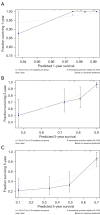Establishment of a prognosis-related predictive model for hepatocellular carcinoma patients with macrovascular invasion treated with transcatheter arterial chemoembolization combined with intensity modulated radiotherapy
- PMID: 40104734
- PMCID: PMC11912082
- DOI: 10.21037/tcr-24-1226
Establishment of a prognosis-related predictive model for hepatocellular carcinoma patients with macrovascular invasion treated with transcatheter arterial chemoembolization combined with intensity modulated radiotherapy
Abstract
Background: So far, there are still few studies on the prognostic factors of hepatocellular carcinoma (HCC) patients with macrovascular invasion (MVI) treated with transcatheter arterial chemoembolization (TACE) combined with intensity modulated radiotherapy (IMRT), and no relevant model has been established to predict the prognosis of such patients. Thus, the purpose of this study was to determine the prognostic factors of HCC patients with MVI after treatment with TACE combined with IMRT, and to establish a nomogram model for forecasting 1-, 3-, 5-year overall survival (OS) of the patients.
Methods: HCC patients with MVI who were diagnosed and treated at Department of Gastroenterology, 3201 Hospital between January 2010 and December 2020 were enrolled in this study according to the inclusion and exclusion criteria. The risk factors linked to patient OS were determined by performing Cox regression analysis. The nomogram for predicting 1-, 3-, 5-year OS in HCC patients with MVI was stablished and validated based on the results of the Cox regression analysis.
Results: In total, 118 patients were included in the current study. The medium follow-up time was 46 months (range, 29-71 months). Univariate Cox regression analysis revealed that tumor diameter, treatment frequency of TACE, IMRT dose, Child-Pugh grade, liver cirrhosis and alpha fetoprotein (AFP) level were significantly related to the OS of the patients. Further multivariate Cox regression analysis showed that treatment frequency of TACE and Child-Pugh grade, liver cirrhosis and AFP level were the independent prognostic factors of the OS in patients who were treated with TACE combined with IMRT. The nomogram we constructed using the above independent risk factors exhibited good ability for predicting 1-, 3-, 5-year OS of the patients. The concordance-index of the nomogram was 0.727, indicating the nomogram had a good discrimination.
Conclusions: Treatment frequency of TACE and Child-Pugh grade, liver cirrhosis and AFP level were independent predictors of OS in HCC patients with MVI after TACE combined with IMRT treatment. The nomogram that we developed using these predictors provided a convenient tool to predict the survival probability in HCC patients with MVI.
Keywords: Hepatocellular carcinoma (HCC); intensity modulated radiotherapy (IMRT); macrovascular invasion (MVI); nomogram; transcatheter arterial chemoembolization (TACE).
Copyright © 2025 AME Publishing Company. All rights reserved.
Conflict of interest statement
Conflicts of Interest: All authors have completed the ICMJE uniform disclosure form (available at https://tcr.amegroups.com/article/view/10.21037/tcr-24-1226/coif). The authors have no conflicts of interest to declare.
Figures


Similar articles
-
Combination treatment of transcatheter arterial chemoembolization, intensity-modulated radiotherapy, and sorafenib for hepatocellular carcinoma with macrovascular invasion.Medicine (Baltimore). 2023 Nov 10;102(45):e35713. doi: 10.1097/MD.0000000000035713. Medicine (Baltimore). 2023. PMID: 37960807 Free PMC article.
-
Efficacy of postoperative adjuvant transcatheter arterial chemoembolization in hepatocellular carcinoma patients with microvascular invasion.World J Gastroenterol. 2017 Nov 7;23(41):7415-7424. doi: 10.3748/wjg.v23.i41.7415. World J Gastroenterol. 2017. PMID: 29151695 Free PMC article.
-
Transhepatectomy combined with arterial chemoembolization and transcatheter arterial chemoembolization in the treatment of hepatocellular carcinoma: a clinical prognostic analysis.BMC Gastroenterol. 2023 Sep 5;23(1):299. doi: 10.1186/s12876-023-02886-1. BMC Gastroenterol. 2023. PMID: 37670232 Free PMC article.
-
Adjuvant transarterial chemoembolization improves survival outcomes in hepatocellular carcinoma with microvascular invasion: A systematic review and meta-analysis.Eur J Surg Oncol. 2019 Nov;45(11):2188-2196. doi: 10.1016/j.ejso.2019.06.031. Epub 2019 Jun 25. Eur J Surg Oncol. 2019. PMID: 31256949
-
The effects of several postoperative adjuvant therapies for hepatocellular carcinoma patients with microvascular invasion after curative resection: a systematic review and meta-analysis.Cancer Cell Int. 2021 Feb 6;21(1):92. doi: 10.1186/s12935-021-01790-6. Cancer Cell Int. 2021. PMID: 33549093 Free PMC article. Review.
References
-
- Fujii T, Takayasu K, Muramatsu Y, et al. Hepatocellular carcinoma with portal tumor thrombus: analysis of factors determining prognosis. Jpn J Clin Oncol 1993;23:105-9. - PubMed
LinkOut - more resources
Full Text Sources
Miscellaneous
